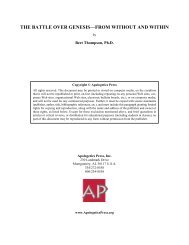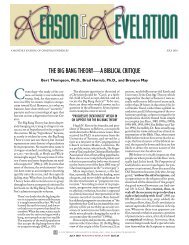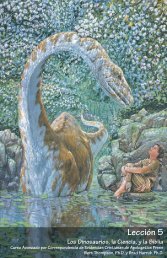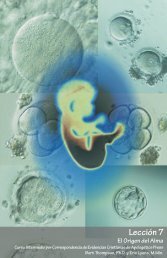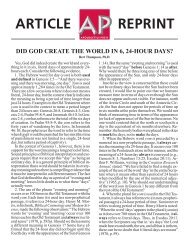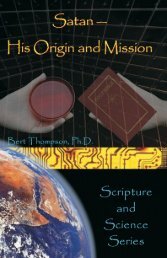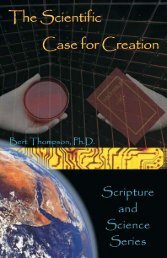The Many Faces, and Causes, of Unbelief - Apologetics Press
The Many Faces, and Causes, of Unbelief - Apologetics Press
The Many Faces, and Causes, of Unbelief - Apologetics Press
Create successful ePaper yourself
Turn your PDF publications into a flip-book with our unique Google optimized e-Paper software.
<strong>The</strong>re are different varieties <strong>of</strong> pantheism, to be sure. In<br />
his book, Christian <strong>Apologetics</strong>, Norman Geisler devoted an<br />
entire chapter to a discussion <strong>of</strong> these variants (1976, pp. 173<br />
192). But perhaps one <strong>of</strong> the most important threads running<br />
through each is the identification <strong>of</strong> God with the world. Winfried<br />
Corduan addressed this topic when he observed:<br />
In this worldview, God <strong>and</strong> the world are identical,<br />
not just in the sense <strong>of</strong> identical twins, who merely resemble<br />
each other strongly, but in the sense <strong>of</strong> being<br />
one <strong>and</strong> the same thing. <strong>The</strong> words “world” <strong>and</strong> “God”<br />
are then used as two different expressions for one thing<br />
(1993, p. 92).<br />
Think about the implications <strong>of</strong> such a view. If pantheism<br />
is correct, then there no longer is a need for we humans to<br />
“look beyond ourselves” for solutions to whatever problems<br />
it is that plague us. Instead, we simply may “look within.” We,<br />
being God, are our own source <strong>of</strong> truth. We, being God, can<br />
decide what is right <strong>and</strong> what is wrong. All the power that we<br />
need to cope with life <strong>and</strong> its vagaries lies within the untapped<br />
reservoir <strong>of</strong> human potential we call “self.”<br />
Sounds good—at first glance. But carry this kind <strong>of</strong> thinking<br />
to its logical end. First, if we are God, sin <strong>and</strong> its associated<br />
concept <strong>of</strong> redemption become unnecessary. Second, because<br />
God is not beyond the world but in it, there can be no miracles<br />
(as we normally would employ that term—i.e., supernatural<br />
events). While there may be supernormal events (e.g.,<br />
channelings, healings, the ability to resist pain while walking<br />
on a bed <strong>of</strong> hot coals, etc.), since these things are not accomplished<br />
by any power outside the Universe, but instead are<br />
the result <strong>of</strong> people realizing <strong>and</strong> employing their divine potential,<br />
then “miracles” do not <strong>and</strong> cannot occur. Third, in<br />
pantheism there is neither need <strong>of</strong>, nor allowance for, divine<br />
providence. <strong>The</strong> consensus <strong>of</strong> pantheism is that, since God is<br />
all <strong>and</strong> all is God, <strong>and</strong> since God is good, then anything evil<br />
must not, <strong>and</strong> cannot, really exist. After all, if it existed, it<br />
would be God. As the pantheists themselves put it:<br />
-42



